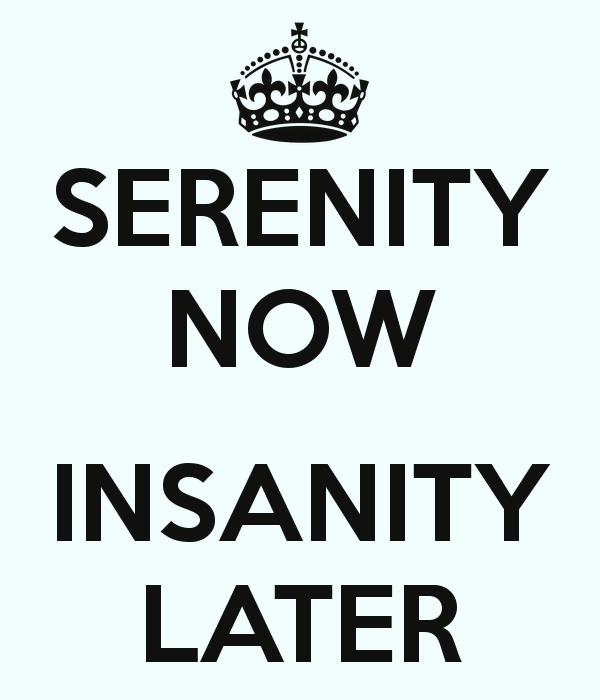
Serenity now … Serenity how?
When you experience an emotion, identify the emotion (to yourself). “I feel [insert emotion here].”
But don’t blame the cause of the emotion on some person, situation or thing.
In other words: Do not say, “I’m depressed because I didn’t get the job I wanted.” Instead say, “I’m depressed because of the thoughts I’m having after the job letdown.”
Do not say: “I’m hurt because of what Larry said or did.” Instead say: “I’m hurt because of the thoughts I have in the aftermath of what Larry said/did.”
Do not say: “I’m stressed because of the weather.” Say: “I’m stressed because of the thoughts I’m having about the weather.”
Why blame yourself for your emotions, instead of something or someone external? Because it is your own thoughts causing your emotion.
“This computer won’t work. I’m so upset!”
No, that’s not quite it.
What’s really going on? Your computer is not working. You’re having split second thoughts, so quickly you don’t even know what they are. The emotional state we term as “anger” or “frustration” sums those thoughts up for you.
If your thoughts are, “This computer will not work, I have no reasonable way to fix it, it’s a catastrophe and everything is ruined,” then you will have one kind of emotional reaction. Probably something like anger or rage.
If your thoughts are, “I’m sure there’s an explanation; if it’s simple, I will fix it quickly; if it’s not, I can find the help to take care of this and utilize a back-up option, e.g. my friend’s computer or my other computer,” then you’ll have a much calmer reaction. Annoyed, perhaps, but your day will not be ruined and your blood pressure will not rise too high.
My point: Your emotions do not come out of nowhere. They happen because of the way you’re in the habit of thinking, whether the situation is a nonfunctional computer, or anything else.
This is how human psychology works. Everyone may have different personality traits or temperaments, issues or lack of issues, but the fundamentals are the same for everyone.
When you identify your thoughts as the cause of your emotions, you’re placing the solution in yourself.
“My thought about the weather is that it’s a disaster, and that it has ruined my day. But there are other ways to look at the weather. Other facts are involved, and other conclusions are possible.”
The same goes for anger or hurt towards another person. “I’m mad because of Jennifer.” That gives all the power to Jennifer. Instead, you could say, “I’m angry at Jennifer because she did something wrong.” Maybe she did. And maybe you’re right to hold her accountable in any way you can. But the emotion of anger is really your own.
And then there’s the news. “I’m so depressed after watching or reading the news. There’s nothing I can do.” Did the news make you feel that way? No, not really. The way you interpret the news will.
“Everything is bad, there are no good people, and there’s nothing good anyone can do about it. Good or true ideas have no power.” If you believe these things, or have these thoughts, then you will have one kind of emotional reaction to the news.
“Good ideas are ultimately more powerful than bad ones. What makes bad ideas wrong is their lack of logic, justice and regard for human nature. Even when people hold on to bad ideas, they have to pay the price for doing so. Some will want solutions and eventually consider course corrections in their thinking and attitudes, especially when things get so bad they have little choice.” If you think these kinds of thoughts, you will not feel as depressed and hopeless as you would if you thought in a different way.
In a certain sense, it’s true that we are what we feel. Our emotions define us. But emotions, in turn, are created by what we think. What we “think” includes what we assume, believe, reason out, fail to reason out and say to ourselves.
To some, it seems like unfair self-blame to hold yourself accountable for your emotions. And emotions can be very powerful. They can be very strong, come up quickly and seem, therefore, like they have no causes — or if they do, it certainly has nothing to do with us.
But emotions are products of our minds and brains. The root of every feeling is some thought, idea, articulated or unarticulated premise or assumption.
The best way to “control” your emotions is to know their source. Emotions do not need control so much as reason. Self-control comes from reason — specifically, your own reasoning applied to your emotions.
The essence of mental health is a state of serenity. Knowing the content of your emotions, and how to reason with your own emotions, is the root of serenity, as well as everything else (romantic love, career fulfillment, productive purpose, hobbies, etc.) which make life worthwhile.
Be sure to “friend” Dr. Hurd on Facebook. Search under “Michael Hurd” (Rehoboth Beach DE). Get up-to-the-minute postings, recommended articles and links, and engage in back-and-forth discussion with Dr. Hurd on topics of interest. Also follow Dr. Hurd on Twitter at @MichaelJHurd1
